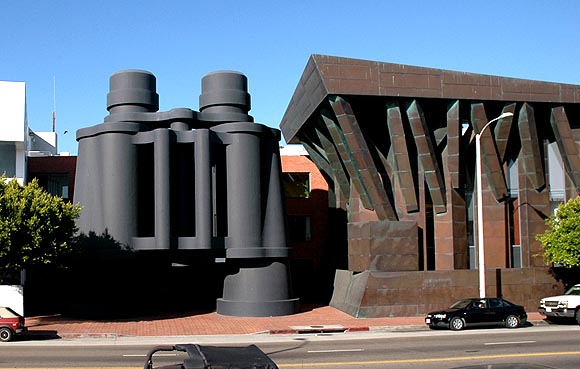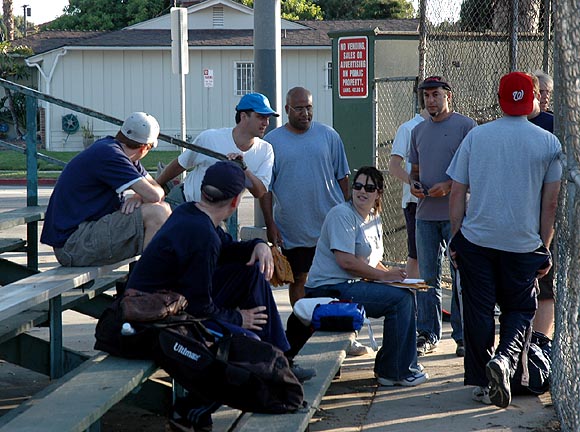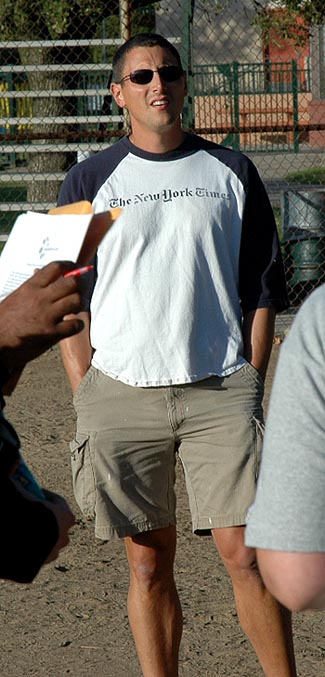Seymour Hersh in the current New Yorker in Watergate Days notes way back in "those days" Woodward and Bernstein "were operating in a democracy in which they were accountable to a Constitution and to a citizenry that held its leaders to a high standard of morality and integrity. That is the legacy of Watergate."
So how is the press doing these days? Does this "legacy of Watergate" live on?
Well, someone finally asked Bush about the Downing Street memo – at Tuesday's Press conference. And Bush publicly said: "The facts were not being fixed, in any shape or form at all." As you recall, the memo was the British government's notes on how to deal with what was happening in Washington in July of 2003 and contained the line - "Bush wanted to remove Saddam, though military action, justified by the conjunction of terrorism and WMD. But the intelligence and facts were being fixed around the policy." At the time, we were saying we didn't want war, that we were working on a diplomatic resolution. Ah, the Brits misunderstood.
But at least someone finally asked, on June 7 – even if memo was made public on the first day in May. A bit of a gap – but there was the runaway bride and Michael Jackson to deal with.
Paul McLeary in the Columbia Journalism Review provides a review of the delay in Downing Street Memo - a Slow Fire Shows Flickers of Life - Given the number of fluff pieces running in major newspapers and on television news, it's exasperating to watch a story that might actually be important (and there aren't many) slowly wind its way aimlessly through the media, never quite building up the head of steam necessary to burst onto front pages.
? coverage of the memo in the American media had been almost non-existent, as opposed to the British media, which was battering Tony Blair about the head with it pretty handily in the run-up to elections there.
Since then, coverage of the memo and the questions about the cooking of intelligence it raises have stayed off the front pages, despite the fact that liberal bloggers have been
throwing fits on a daily basis over the lack of major media coverage.
But now something seems to have changed, however slightly, in the story of the story.
What changed? Tim Russert, interviewed Republican National Committee chief Ken Mehlman on "Meet the Press." (Discussed previously here.) And on Sunday, the new public editor of the New York Times, Byron Calame, made reference to the paper's lack of coverage of the issue. And McLeary notes that starting Tuesday - ? we've seen a relative explosion of coverage of the memo, with the New York Times and Washington Post throwing their hat into the ring. The Times ran a piece looking at Tony Blair's visit to Washington, noting that yesterday's meeting between Bush and Blair would be their first since "the disclosure last month of a memo written by a foreign policy aide to Mr. Blair in 2002 that reported ... that the White House was fixing its 'intelligence and facts' about the threat from Saddam Hussein 'around the policy' of removing him from power through military action."
Not exactly in-depth coverage, but it captures the essence of the memo well enough, and we'll take what we can get.
It will do. And if you got to McLeary's item you'll find kinks to new coverage all over the place. Not a Watergate flood of stories, but it will do.
And the jury is still considering whether Michael Jackson is or is not a pervert, so it's something to report. Filler? One newsreader's filler is another's top story.
Eric Alterman over at MSNBC notes other stirrings of a press reporting what a hunkered-down administration doesn't want reported. His list?
Bush's Unofficial Official Secrets Act: How the Justice Department Has Pushed to Criminalize The Disclosure of Non-Security Related Government Information - this is John Dean in Find Law explaining the new rules that keep information from citizens. Stuff that should be kept secret? Not exactly. Yes, that is the same John Dean from Watergate days, Nixon's personal attorney who blew the whistle (or one of the whistles) ? and he's now out here in Los Angeles doing the same sort of thing.
And the Washington Post still breaks stories ?
Details on Boeing Deal Sought
Senators Raise Questions About White House Involvement
Mike Allen - Wednesday, June 8, 2005; Page A19 Senators urged the Pentagon's inspector general yesterday to release more information about the involvement of White House officials and Defense Secretary Donald H. Rumsfeld in an aborted $30 billion air-tanker deal that exposed gaping holes in the government's controls on large purchases. ?
Yeah, the White House is bailing out Boeing ? whose new tanker design doesn't even meet specs - while bitching about European subsidies to Airbus. The senators ask ? and the Post has dug up embarrassing memos. Not exactly Watergate stuff, but something. Page A19 may be appropriate.
And the Post is also on this ?
New Worlds To Censor
Adam Thierer - Tuesday, June 7, 2005; Page A23 A troubling shift is underway in how lawmakers censor media in this country. Sen. Ted Stevens (R-Alaska) and Rep. Joe Barton (R-Tex.), chairmen of the Senate and House commerce committees, as well as Kevin Martin, the new head of the Federal Communications Commission, are proposing to broaden federal broadcast "indecency" regulations to cover cable and satellite television. And a separate measure recently introduced in the Senate would regulate "excessively violent" programming, not just in broadcasting but on cable and satellite service as well.
Oh, not a big issue outside the blogs ? but these guys like to shut things down. Limiting what folks can watch, or listen to, even if they pay for it, seems to part of a hard Jones these Republican right guys have. The Post is troubled. The impulse to shut down disturbing things is hard to resist, when you can.
And in USA TODAY of all places you'll find a long item on the tradition of low-level grunts being punished for military policies implemented by higher-ups who get promoted. It used to be such articles were the standard stuff of the left, and such contentions denounced as treason by the hard right. It the whole "a few bad apples" business. But when USA TODAY starts up with such stuff? Oh my!
And the New York Times offers a bit of its own investigative reporting ?
Bush Aide Softened Greenhouse Gas Links to Global Warming
Andrew C. Revkin - June 8, 2005 A White House official who once led the oil industry's fight against limits on greenhouse gases has repeatedly edited government climate reports in ways that play down links between such emissions and global warming, according to internal documents.
In handwritten notes on drafts of several reports issued in 2002 and 2003, the official, Philip A. Cooney, removed or adjusted descriptions of climate research that government scientists and their supervisors, including some senior Bush administration officials, had already approved. In many cases, the changes appeared in the final reports. ?
Yeah, so what else is new? But they dug it up.
Even the conservative John Cole is upset - "Sometimes I wake up and read the papers and just want to scream."
Ah. Good. His reaction? ? "Do they think this is a school project, and all they have to do is fool the teacher and climate change won't be an issue? I don't want junk science or unfounded claims going forward, either, but it is becoming pretty clear to me that faith-based governance simply means that anything you don't like or anything that might require a change in your policy position should be ignored or labeled 'junk science.'"
Maybe the press is doing its job.
Hey, even in Albany, New York the press is doing its job, as Steve Lovelady notes here - Our attention has been called to a substantive Albany Times-Union piece by reporter Brendan Lyons, in which retired FBI agent Paul Daly reveals that, in a sense, Deep Throat was a clandestine group of four baritones -- not just W. Mark Felt, but also three of his deputies: Richard Long, chief of the FBI's white-collar crimes section during Watergate; Robert G. Kunkel, agent-in-charge of the Washington field office, which led the Watergate investigation; and Charles Bates, who was assistant director of the FBI's criminal investigative division.
The four saw themselves, the Times-Union notes, not as disgruntled mavericks, but as a clandestine group in a high-stakes fight to the death with a White House that was itself trying desperately to rein in the FBI's Watergate investigation. The four met regularly to compare notes and to decide what new tidbits to feed out to the public -- with Bob Woodward and the Washington Post selected as their weapon of choice -- so as to illustrate just how deep the rot ran.
Looked at this way, the enterprise takes on a new light, one neither noble nor venal. What it was, was office politics at a very high level, employed by powerful bureaucrats intent upon preserving not just their ongoing investigation but also their agency's very independence.
? Kudos to Lyons and the Times-Union for a nuanced piece of reporting that goes well beyond just rehashing everyone's favorite movie. And for finding a local source who puts a new perspective on one of the biggest national stories of the past half-century.
Yep ? and cool on two levels. Felt wasn't alone ? there were more like him, whatever their motivations, and even in Albany you get good reporting. Of course Steve Lovelady adds that Harry Rosenfeld, editor-at-large and columnist for the Times-Union, was city editor of the Washington Post in the early 1970's and was in charge of its day-to-day Watergate coverage. Not only the legacy lives on, so do the players.
So what is the administration to do if the press does its job?
Here's an idea.
Torture's Part of the Territory
Naomi Klein, Los Angeles Times, June 7, 2005
She sets the scene - Brace yourself for a flood of gruesome new torture snapshots. Last week, a federal judge ordered the Defense Department to release dozens of additional photographs and videotapes depicting prisoner abuse at Abu Ghraib.
The photographs will elicit what has become a predictable response: Secretary of Defense Donald Rumsfeld will claim to be shocked and will assure us that action is already being taken to prevent such abuses from happening again. But imagine, for a moment, if events followed a different script. Imagine if Rumsfeld responded like Col. Mathieu in "Battle of Algiers," Gillo Pontecorvo's famed 1965 film about the National Liberation Front's attempt to liberate Algeria from French colonial rule. In one of the film's key scenes, Mathieu finds himself in a situation familiar to top officials in the Bush administration: He is being grilled by a room filled with journalists about allegations that French paratroopers are torturing Algerian prisoners.
Based on real-life French commander Gen. Jacques Massus, Mathieu neither denies the abuse nor claims that those responsible will be punished. Instead, he flips the tables on the scandalized reporters, most of whom work for newspapers that overwhelmingly support France's continued occupation of Algeria. Torture "isn't the problem," he says calmly. "The problem is the FLN wants to throw us out of Algeria and we want to stay?. It's my turn to ask a question. Should France stay in Algeria? If your answer is still yes, then you must accept all the consequences."
His point, as relevant in Iraq today as it was in Algeria in 1957, is that there is no nice, humanitarian way to occupy a nation against the will of its people. Those who support such an occupation don't have the right to morally separate themselves from the brutality it requires. ?
Her suggestion? Well, you could tell it like it is. When the next batch of photographs from Abu Ghraib appear, many Americans will be morally outraged, and rightly so. But perhaps some brave official will take a lesson from Col. Mathieu and dare to turn the tables: Should the United States stay in Iraq? If your answer is still yes, then you must accept all the consequences.
Now there's an idea. Don't do the whole "a few bad apples" tap dance. Just say, "Yeah, well, this is what we're doing, and if you have a problem with it write your damned congressman, or vote in an election now and then."
Oh, we'll get the tap dance.
And we will too get the old "the press is evil" number as Tom Tomorrow, the political cartoonist with the funny pseudonym, explains here - ? one of the major debate strategies of the right is to find any inconsistency in a story and use it to discredit the entire story. Given the inherent fallibility of human beings, this is a pretty easy task - there's always going to be some detail that somebody got wrong, some mistaken detail in an otherwise true story. Or, at the very least, there will be an inexact turn of phrase or metaphor (a word like "gulag", say) which can be seized upon to channel attention away from the issue itself.
Go read his example of the current debate over how many "detainees" in our chain of hold-'em-without-charges facilities died under our very focused questioning. Was it two, thirty-seven, one hundred? Is the press accurate? The number one hundred is floating around.? but since the Army itself "only" officially acknowledges 37 deaths, then, well, clearly the entire thing is just 'nother fiction promulgated by the Lying Liberal Media. And the righties can go back to pretending that the worst allegation of abuse anyone anywhere has made was about Korans in toilets. Oh, and that one night at Abu Ghraib when everyone took those photos, but the guilty have been punished and we've put all that behind us now. Next subject please.
Heck, it works. Or it has worked so far.
But maybe there is a change in the air.









